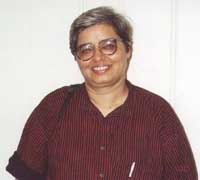A television news channel carried the news report of a clutch of civil society organizations and NGOs getting involved in sensitizing voters in Madhya Pradesh so as to keep the BJP returning back to power in the coming elections. The channel showed the footage of left leaning activist Shabnam Hashmi as among those involved in the exercise. According to her and her fellow activists; a return to power by the BJP would ensure that key institutions would be irretrievably captured and compromised ideologically. Of course, given Hashmi’s political convictions, this thinking is not unusual; but what is important here is to recognize the role and platform that civil society institutions can and do provide to the common man to enter the hurly burly of politics.

Looking at the money and muscle power that seemingly casts a long shadow over the politics of the day, the common man may well feel overwhelmingly helpless in being able to do any thing at all to make a difference. There are many who would love to more involved in the matters of governance of the country than merely casting a vote once in five years or less. Not every one wants to be a parliamentarian or a legislator and be directly involved in governance but a lot of us surely want to influence the ways in which laws and polices are formulated and then promulgated and eventually enforced. Law making is not the preserve of elected parliamentarians or a bunch of elite bureaucrats alone though they make be the ones who are the institutional gate keepers. But to the extent that laws and policies affect directly or indirectly all of us, it should be the endeavor of all of us to try and be engaged in smaller or larger measure.

This is where civil society institutions can play an important role. Traditionally in India, policies and laws have almost been influenced not through open and transparent debate but through backroom intrigue – the reference to dalal salaam by the BJP recently has some background and history attached to it for it is them acting at the behest of powerful business houses (usually) who do all the lobbying and dealing and the wheeling and the dealing.
NGOs and civil society institutions can bring these hitherto hidden matters out of the closet and help shape public opinion by bringing out nuances in various policy alternatives and options and creating an informed voter base. In the ongoing matter of the Indo – American nuclear deal for example, how many of us can really stand up and be counted that we understand all the finer points? The debate has been confined to small sections of the scientific community and the political class and mostly they see and hear what they want to see and hear. For those like former President Abdul Kalaam, the deal is a panacea for the country’s chronic energy ills, while for others the nuclear deal will make us a client state of the Americans.
![]()
Now this is not typical NGO work and those who do engage in quasi political activity do so not so much in a evidence based, semi academic way, presenting and then debating all sides of the equation but rather driven by their own ideology and convictions as Shabnam Hashmi is doing. There is nothing wrong with that approach of course – to be driven by the strength of our convictions; but the problem is that many of us simply have not had the chance to develop our stand on many issues simply because we do not know all the material facts at hand on the basis of which we can make up our mind! And this is therefore an arena where we need some sarva shiksha abhiyan!


No comments:
Post a Comment